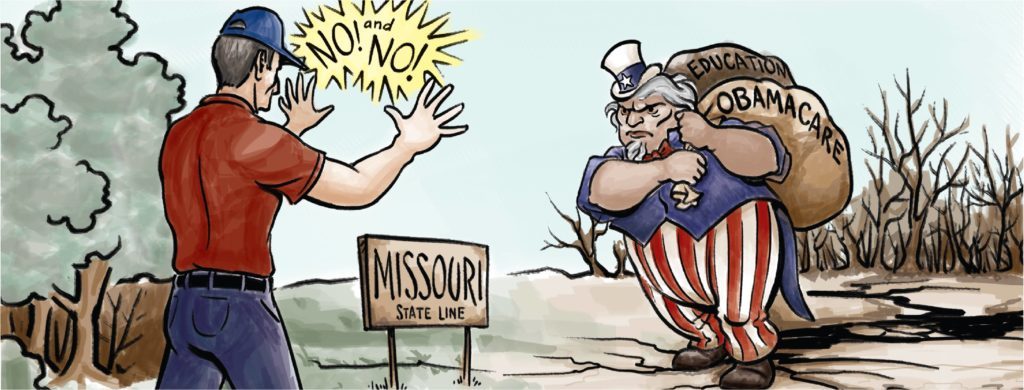If you ask most Americans what about the bloated federal government affects their lives most negatively, you’d get an overwhelming agreement among the vast majority: income tax. It might, then, be time to think about collecting federal revenue in a different way. And a federalist at heart knows the best way to do that.
Let’s first discuss what is inherently evil about the federal income tax and then seek a solution that answers all those issues.
- The federal income tax inserts the hand of the federal government directly in the pockets of American citizens. There is an ongoing argument (and, by “ongoing”, I mean, “to the Supreme Court in almost every decade since the founding”) of what is and is not a direct tax, as prohibited in the original Constitution. [The fact is, the founders didn’t know themselves. Although the term “direct taxation” is used twice in the Second Article, the only discussion of “direct taxation” in all the notes of the Convention’s discussion are from Madison. “Mr King asked what was the precise meaning of direct taxation? No one answd.” Madison’s notes of Aug 20] It matters not, really, because the 16th amendment makes a direct tax without apportionment completely Constitutional. And this, in and of itself, is bad. From a federalist perspective, with only very few stated exceptions (treason, for example) the individual citizen is not in any direct line of command from the federal government. Including the power of taxation, that is as it should be.
- The federal income tax (especially in conjunction with a popular Senate — see “The New and Improved Senate“ to find a solution to that mess), leaves the federal government in complete control of its own stream of revenue. The central government not only has direct contact with those whom it taxes, but also it becomes the sole arbiter of how much revenue it seizes. From our paycheck to federal treasury coffers, the central government controls the entire process.
- The federal income tax provides the central government with power in the form of information. Solely because of the income tax, the government has a complete database of how much I make, how much I have, and how much you and Bill Gates make and have. This information quickly becomes weaponized in government’s lust for continued class warfare.
- The federal income tax lends itself to cronyism and favor seeking. Special interests buy lucrative tax breaks, incentives, and favors for quid pro quo donations and lobbyist graft. Wealthy donors carve out lower rates for their capital gains and investment “incomes” while our “incomes” are taxed at the higher rates, rendering the “progressive” income tax anything but. Large, wealthy corporations use engineered tax loopholes and incentives to drive smaller competitors out of business.
I propose we return all federal taxation to an apportioned tax on States. Then, let the States determine how best to collect their share of the revenue due the federal government. Here is my proposed amendment to repeal the 16th:
Section 1. The Sixteenth Article of Amendment to the Constitution of the United States is hereby repealed. No direct taxation of citizens is permitted the federal government.
Section 2. The United States Congress shall pass a budget for each fiscal year no later than 15 months prior to the beginning of that fiscal year and levy upon each State their representative portion of the revenues to fund the budget. The representative portion shall be that States share of the population at the last 10-year census.
Section 3. In case of war lawfully declared by the Congress as stipulated in Article 1, Sec 8; the House of Representatives, with concurrence of the Senate, may levy to each State proportionately an emergency tax specifically appropriated to waging that war. However, the expected cost of continued war must be included in the budget of the next fiscal year and levied upon the States at the time of the annual levy. This does not preclude further emergency war funds should the cost exceed the budgeted amount.
Section 4. Except the indirect tax on citizens levied through the State governments, no further federal revenue may be exacted from the citizens, either directly or indirectly, unless a State fails to pay its apportioned share of the budget, after which the federal government may directly tax that States citizens.
Section 5. This article shall be inoperative unless and until it has been ratified as an amendment to the Constitution of the United States by the legislatures of three-fourths of the several states within a period of ten years.
Aside from solving the problems identified with a direct federal income tax above, this amendment resolves several other plagues inherent to our lopsided government. The federal government now must write (and then abide by) a budget. The federal government cannot long sustain undeclared wars, but it does retain emergency powers in case of declared war. And if this amendment is adopted in conjunction with our proposed amendment to repeal the 17th and the adoption of the State Powers amendment, States can levy immense federalist power to rein in federal spending.
Comment here or email me at federalist1@restoringamericanfederalism.com
American Federalism, a definition.
“The powers delegated by the proposed Constitution to the federal government are few and defined. Those which are to remain in the State governments are numerous and indefinite. The former will be exercised principally on external objects, as war, peace, negotiation, and foreign commerce; with which last the power of taxation will, for the most part, be connected. The powers reserved to the several States will extend to all the objects which, in the ordinary course of affairs, concern the lives, liberties, and properties of the people, and the internal order, improvement, and prosperity of the State.” (Emphasis added) James Madison, Federalist 45



